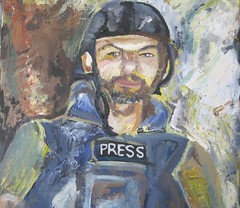Ghaith and his friends had been living outside of the green zone in Baghdad and scoffed at my tales of incoming mortar attacks and narrow misses. This bunch had looked death in the eye far more frequently than I. They spoke of the dead burning on the streets of Baghdad and stood outside to smoke during rocket attacks.

I’ve just learned from a Frontline Club Tweet that award winning Guardian journalist Ghaith Abdul-Ahad and two other journalists have been released after being held hostage for six days in Afghanistan.
I met Ghaith in Iraq a few years ago. I hadn’t met many journalists before and to be honest my view was wholly negative. Tabloid, paparazzi, no respect for privacy and out to make money from stories any way they could. But over the summer of 2006 I met a different breed of journalist which made me change my mind about that. Ghaith was one of them.
Along with a CNN crew (including Michale Ware), Ghaith and I shared a few intense days working together at the British base in Basra. Ghaith and his friends had been living outside of the green zone in Baghdad and scoffed at my tales of incoming mortar attacks and narrow misses. This bunch had looked death in the eye far more frequently than I. They spoke of the dead burning on the streets of Baghdad and stood outside to smoke during rocket attacks. When I tried to brief them on security – to rush undercover as soon as explosions were heard – Ghaith chuckled and his CNN pal muttered that they would in fact do the exact opposite – capturing the devastation of war on camera was their mission.
I have since battled with myself as to whether the media coverage of the wars in Afghanistan and Iraq have actually helped resolve conflict or made matters worse. There is argument for both. But what is clear is the exceptional nature of this calibre of journalist. People like Ghaith spend their whole lives amidst unrest, their mission to record it as best they can, whether they are embedded with coalition or NATO troops, or hanging out with villagers, they are moved by a desire to tell us back home how it is for the people. Today’s war dead are 75% civilian. Just a hundred years ago it was only 5%. Like the War Poets of the first world war, who used their craft to express the horrors they witnessed, so does the modern day journalist.
In homage to the people I had met, I embarked on a series of portraits. It took me over two years to complete, and the collection “Correspondents in Conflict – War Poets of Today” was fittingly shown at the Frontline Club in London earlier this year (and continues to tour). The portrait of Ghaith (above) is one of my favourites – he is wearing his “lucky” body armour streaked with salt from sweaty encounters. I wonder if he was wearing it in Afghanistan this week – for it appears as if luck may have been on his side. Long may it continue that way.

Source: 4nomadic.wordpress.com

No comments:
Post a Comment